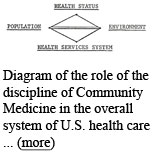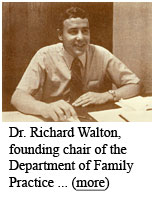Family Medicine Comes to Massachusetts (cont'd.)
The UMass Residency
In contrast to other medical schools of the post-war decades, UMass Medical School was not originally founded by the Legislature with an explicit mandate to promote primary care. Rather, the legislation authorizing the state university to found a medical school, which was passed in July, 1962, was impelled by a growing awareness that a national physician shortage, and especially caregivers for the underserved, was being felt by many of their constituents. Moreover, the lack of sufficient openings for home-state students in the private medical schools of Massachusetts made it likely that future physicians from the state would be lured away to practice elsewhere unless some way could be found to educate them in Massachusetts. At the same time, in a region with several highly ranked medical schools, the legislature and the University of Massachusetts's Board of Trustees were determined to build a school of comparably high quality. At the time, notions of "quality" were synonymous with specialization and biomedical research. Thus, unlike some schools opened at the same time, such as the Brown University School of Medicine, Dr. Lamar Soutter, founding dean at UMass Med, was committed to building both the medical school and a tertiary care hospital to support specialty and subspecialty education.(35)
The original vision behind the new school, therefore, coexisted less than comfortably with developments in the realm of primary care and
 family medicine during the decade which followed its chartering by the Massachusetts Legislature in 1962. Indeed, when the school opened
in 1970, a department of Community Medicine had been created with an eye to educating medical students in understanding the big picture
of health and disease, but with plans for educating students for primary care much less developed.(36)
family medicine during the decade which followed its chartering by the Massachusetts Legislature in 1962. Indeed, when the school opened
in 1970, a department of Community Medicine had been created with an eye to educating medical students in understanding the big picture
of health and disease, but with plans for educating students for primary care much less developed.(36)
At the same time, however, concern to demonstrate a commitment to primary care in general slowly brought pressure to the Dean's
Office to prepare the ground for Family Practice. Dr. Richard Walton, a local family physician with a predominantly rural and small-town
practice in Holden, had been hired as an assistant professor of Community Medicine to teach the epidemiology course for the second year
 students and one of the third year clinical rotations. But he was well aware of the growing interest in family practice throughout the
state. By 1973, as the need for primary care education became more pressing, he established a practice in Barre that was affiliated with
Holden Hospital to become the nucleus of the Barre Family Health Center, hired Dr. Sam Pickens as Medical Director (Pickens
continued in that position until 1989), and turned his full attention to planning a Family Medicine residency at UMass. (The first
residents arrived in the summer of 1974.) In 1975, Walton
became Chief of the Program in Family Practice, created to support the new residency and to win accreditation for it. By 1976, they had
graduated their first class of residents, and a year later Walton became the Chair of a free-standing Department of Family
Practice.(37)
students and one of the third year clinical rotations. But he was well aware of the growing interest in family practice throughout the
state. By 1973, as the need for primary care education became more pressing, he established a practice in Barre that was affiliated with
Holden Hospital to become the nucleus of the Barre Family Health Center, hired Dr. Sam Pickens as Medical Director (Pickens
continued in that position until 1989), and turned his full attention to planning a Family Medicine residency at UMass. (The first
residents arrived in the summer of 1974.) In 1975, Walton
became Chief of the Program in Family Practice, created to support the new residency and to win accreditation for it. By 1976, they had
graduated their first class of residents, and a year later Walton became the Chair of a free-standing Department of Family
Practice.(37)
